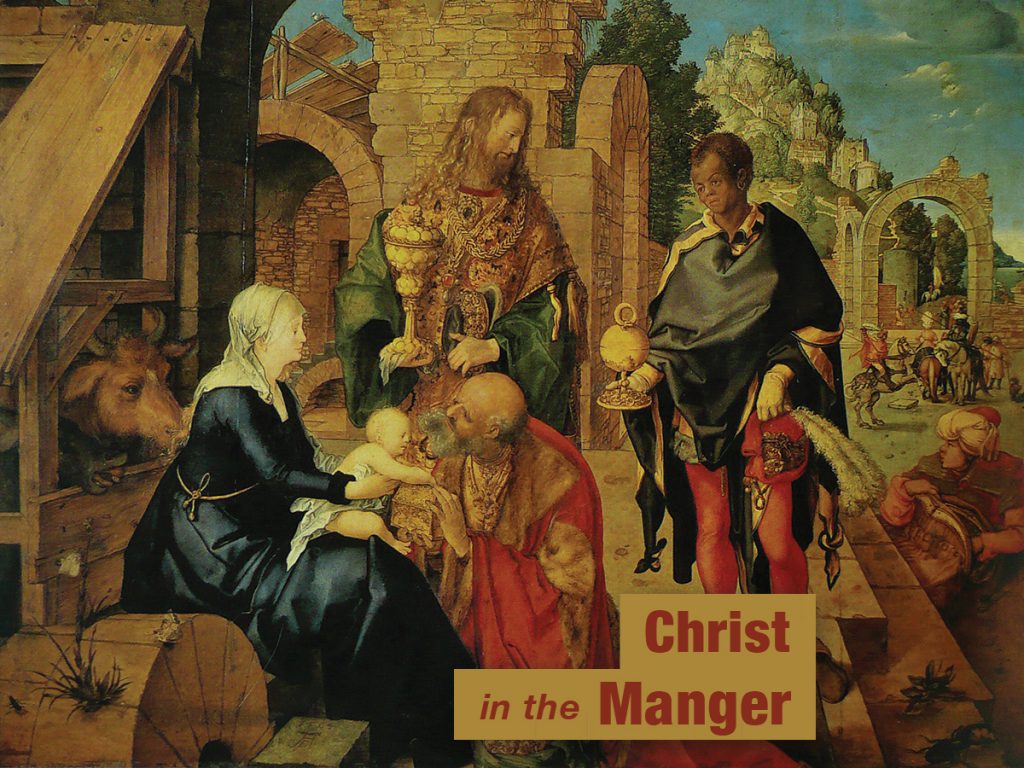Christ in the Manger
 by Robert Mohns
by Robert Mohns
“And she gave birth to her firstborn Son and wrapped Him in swaddling cloths and laid Him in a manger, because there was no place for them in the inn.” – Luke 2:7
In my inaugural year of serving a two-point parish in southern Saskatchewan, a dearly-loved Norwegian grandmother gave my wife and me the gift of a porcelain nativity set that she had made. All the figures, Mary, Joseph, the animals, shepherds, and angels, were cast in a posture of worship. What is more, the figures were cast in such a way that the most natural way to set them up was with the eyes of all centred on the Christ-child.
Martin Luther has referred to Scripture as the manger which holds the Christ-child. Our sainted Norwegian grandmother had blessed our little family with a helpful image of the Christ-child inseparably mangered in the Word. John writes of the inseparable nature of Christ and the Word of God: “In the beginning was the Word, and the Word was with God, and the Word was God” (John 1:1).
As the years passed and the Lord blessed our little family with children, Advent and Christmas were marked with the appearance of that nativity set on the table that served as our family altar.
Advent and Christmas in our household not only marked the appearance of the creche; it was often also marked with seasonal ailments. During those trying and tiring days it was a common thing for the child in the manger to disappear from the creche only to appear in the grasp of a sleeping little one. Hopeless parents, sick child, mangered Christ… Perhaps this is a helpful image of the Christian and also the Church in the world today.
Christ in the manger: the significance of this has not been missed by Christians. Jesus, born in Beth-Lechem—the “House of Bread”—is made secure in strips of linen by His mother, who places Him in a manger, a place where animals feed.
“What else is the manger than the gathering of the Christian people in church to listen to the sermon?”
Luther, in his Christmas Eve sermon on St. Luke’s nativity Gospel, preached: “What else is the manger than the gathering of the Christian people in church to listen to the sermon? We are the animals that go with this manger. There Christ is placed before us, and with this food we are to feed our souls, that is, lead them to the sermon. He who goes to listen to a sermon, goes to this manger, but the sermons must deal with Christ. For not all mangers hold Christ and not all sermons teach the faith” (LW 52).
As God’s rebellious people, we desire to have a Christ without the manger of His Word. The world is filled with Christ-less sermons that come from the mouth of Satan, who continues to entice us to eat of the fruit of the knowledge of good and evil—to be like God. Has there ever been a human who, having eaten this food, became like God? No, not one! It has always resulted in the loss of true humanity, spiritual starvation, and death. All around us—and even within us, if we are brave and honest enough to look at ourselves—we find nothing but loss, famine, poverty, and death that has resulted from this eating.
“This will be a sign for you. You will find a baby wrapped in swaddling clothes and lying in a manger” (Luke 2:12). With these words, the angels directed the starving shepherds to the bread of life, Jesus Christ, placed in a manger, for them. I don’t know if the shepherds were feeling particularly hungry that night, but I do know that they heard and believed the Gospel preached to them by angels. Feeling now their spiritual hunger, they went to Jesus in the manger, and then, filled to overflowing, they went out and told others the words that had been told to them.
In this world of spiritual famine, God still causes His Gospel to be preached to spiritually starving people. You too will find the Christ-child mangered for you in the Christ-centred sermon preached to you and in the body and blood of Jesus for you at the altar. He alone is able to satisfy your hunger. This is the promise that Advent and Christmas proclaim and deliver to you: Christ laid in the manger as the bread of life for you.

May God, by His Spirit, bring us to the creche of His Word, that, by child-like faith we might receive Christ, the bread of life, cling to Him throughout our life’s journey, and, together as Christ’s Church, make known all the words that have been told us concerning Jesus.
———————
Rev. Robert Mohns is Lutheran Church–Canada (LCC)’s West Regional Pastor.
Cover art: Adoration of the Magi, edited, by Albrecht Dürer, c. 1515




